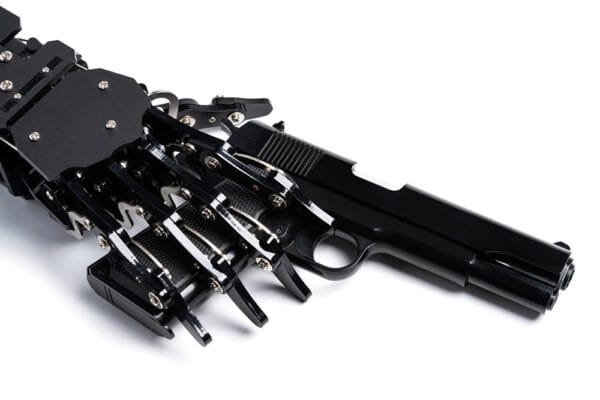
In 2002, Democrat lawmakers in New Jersey passed a first-of-its-kind bill to restrict the handguns that could be sold at retail in that state to “smart guns” (called “personalized guns” in the bill). The law would take effect once the state’s attorney general determined that “at least one manufacturer had delivered at least one production model of a personalized handgun to a registered or licensed wholesale or retail dealer” anywhere in the country.
Among other things, the attorney general was required to set standards, determine whether a handgun met the statutory definition of “personalized handgun,” and compile a list of qualifying guns which could be sold in the state. (Manufacturers seeking to have a gun approved would have to provide a handgun for testing, pay an application fee, and pay the costs associated with testing the gun to ensure it was a “personalized handgun.”) Wholesale and retail gun dealers would be prohibited from importing into and offering for sale any handgun that wasn’t a “personalized handgun,” but this did not apply to handguns sold or transferred to law enforcement officials in New Jersey.
Not much happened until 2014, when the attorney general determined that the Armatix iP1 handgun, which relies on an RFID-enabled wristwatch, did not meet the statutory definition of a “personalized handgun” because, “as a matter of design, the pistol may be fired by a person who is not an authorized or recognized user” as long as the wristwatch was within range.
By 2019, in a tacit recognition of abject failure, almost all of the 2002 law was repealed and replaced with a different “smart gun” mandate. This authorized a special commission that, within a year of organizing, was to develop “personalized handgun performance standards and qualifying criteria,” examine applications by manufacturers, and ultimately create a roster of approved handguns. Within 60 days of the first personalized handgun appearing on the roster, every licensed firearms retail dealer in the state would be compelled to maintain in inventory one or more models of these state-approved guns, “conspicuously” display them, and post signage “disclosing the features of personalized handguns that are not offered by traditional handguns.”
This scheme, too, is having a challenging launch –even the gun control website The Trace admits that “it’s unclear if a controversial state law requiring gun stores to carry smart guns will finally take effect.”
It wasn’t until 2022 that the commission began meeting, and this month, New Jersey’s attorney general announced that the commission had finally completed the initial phase of establishing standards and criteria, which he called a “milestone” in “gun safety.” Out of the commission’s nine minimal requirements, three are copied right out of the 2019 statute, and only five arguably address performance. The handgun must be “reasonably resistant” to being fired by anyone other than the authorized user. The “personalized technology” has to be a “permanent, irremovable part of the handgun and any device or object necessary for the authorized user to fire the handgun.” Another standard appears to eliminate any possibility of mechanical wear-and-tear, requiring that the handgun “not physically deform or deteriorate as a result of firing rounds.”
As the commission moves on to the next phase of designing protocols for testing possible models and creating an application process for manufacturers and others, the question is, will anyone be interested?
Kai Kloepfer, the CEO of Biofire, a technology company working on a new “smart gun,” has indicated he has no intention of submitting his gun to the commission for testing and approval. “We do not support mandates of any kind. We’re looking to build positive long-term relationships with gun stores and forcing these additional administrative burdens doesn’t incentivize them to support our technology; it does the opposite.”
Indeed, the fallout of the 2002 law was that it triggered a furious backlash by the gun community, which maintained – and continues to maintain – that market forces should be allowed to operate normally, without government mandates that use smart guns as the pathway to making traditional firearms illegal. The sponsor of the 2002 law acknowledges that instead of incentivizing research and development of “smart gun” technology, her law accomplished “the exact opposite of what we really intended to do.”
Consumers have other legitimate reasons to be wary of “smart gun” technology. An NRA review of the Armatix iP1, as tested at a range, showed that even with a trained user, the “pistol initially required a full 20 minutes to pair with the watch” and still then needed “a minimum of seven push-button commands and a duration of 12 seconds before the gun can be fired.” Misfires were “common” and the gun had “the worst double-action trigger we’ve ever tested.” And why was the gun equipped with “kill switch” functionality that would allow it to be disabled by third parties? The review concluded that the “NRA only opposes the imposition of technologies via government force, and is happy for the marketplace to pass its own judgment. But if this is the technology upon which smart-gun proponents want the marketplace to base its decision, their rejection will be both swift and brutal.”
It should come as no surprise that none of these real-world reliability issues are addressed in the commission’s new performance standards. Only a gun control jurisdiction like New Jersey would applaud its own mandate that retailers stock guns that don’t work and that gun owners won’t buy as an important step towards saving lives and improving public safety.
About NRA-ILA:
Established in 1975, the Institute for Legislative Action (ILA) is the “lobbying” arm of the National Rifle Association of America. ILA is responsible for preserving the right of all law-abiding individuals in the legislative, political, and legal arenas, to purchase, possess, and use firearms for legitimate purposes as guaranteed by the Second Amendment to the U.S. Constitution. Visit: www.nra.org

